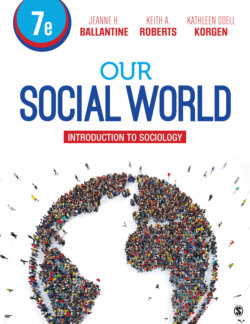Читать книгу Our Social World - Kathleen Odell Korgen - Страница 43
На сайте Литреса книга снята с продажи.
The Social Sciences: A Comparison
ОглавлениеNot so long ago, our views of people and social relationships were based on stereotypes, intuition, superstitions, supernatural explanations, and traditions passed on from one generation to the next. Natural scientists (e.g., chemists, astronomers, biologists, and oceanographers) first used the scientific method, a model later adopted by social scientists. Social scientists, including sociologists, anthropologists, psychologists, economists, cultural geographers, historians, and political scientists, apply the scientific method to study social relationships, to correct misleading and harmful misconceptions about human behavior, and to guide policy decisions. Consider the following examples of specific studies various social scientists have conducted.
Consider an anthropologist who studies garbage. He examines what people discard to understand what kind of lives they lead (Bond 2010). Anthropology is the study of humanity in its broadest context. It is closely related to sociology, and the two areas have common historical roots and sometimes overlapping methodologies and subject matter. However, anthropologists have different specialties in four major subfields within anthropology: physical anthropology (which is related to biology), archaeology, linguistics, and cultural anthropology (sometimes called ethnology). This last field has the most in common with sociology. Cultural anthropologists study the culture, or way of life, of a society.
A psychologist may wire research subjects to a machine that measures their physiological reaction to a violent film clip and then ask them questions about what they were feeling. Psychology is the study of individual behavior and mental processes (e.g., sensation, perception, memory, and thought processes). It differs from sociology in that it focuses on individuals rather than on groups, institutions, and societies. Although there are different branches of psychology, most psychologists are concerned with individual motivations, personality attributes, attitudes, perceptions, abnormal behavior, mental disorders, and the stages of normal human development.
▲ Anthropologists can learn about a society by studying what it throws away. Consider this picture of children rummaging through a garbage dump in India just to survive. What do you think they would learn about you from your garbage?
© Dbimages/Alamy Stock Photo
A political scientist studies opinion poll results to predict who will win the next election, how various groups of people are likely to vote, or how elected officials will vote on proposed legislation. Political science is concerned with government systems and power—how they work, how they are organized, the forms of government, relations among governments, who holds power and how they obtain it, how power is used, and who is politically active (Domhoff 2018). Political science overlaps with sociology, particularly in the study of political theory and the nature and uses of power.
Many economists study the banking system and market trends to try to predict trends and understand the global economy. Economists analyze economic conditions and explore how people organize, produce, and distribute material goods. They are interested in supply and demand, inflation and taxes, prices and manufacturing output, labor organization, employment levels, and comparisons between postindustrial, industrial, and nonindustrial nations.
What these social sciences—sociology, anthropology, psychology, political science, and economics—have in common is that they study aspects of human behavior and social life. Social sciences share many common topics, methods, concepts, research findings, and theories, but each has a different focus or perspective on the social world. Each of these social science studies relates to topics also studied by sociologists, but sociologists focus on human interaction, groups, and social structure, providing the broadest overview of the social world.
Thinking Sociologically
Consider the issue of unemployment in the United States. What is one question in each discipline that an anthropologist, psychologist, political scientist, economist, and sociologist might ask about the social issue of unemployment?
